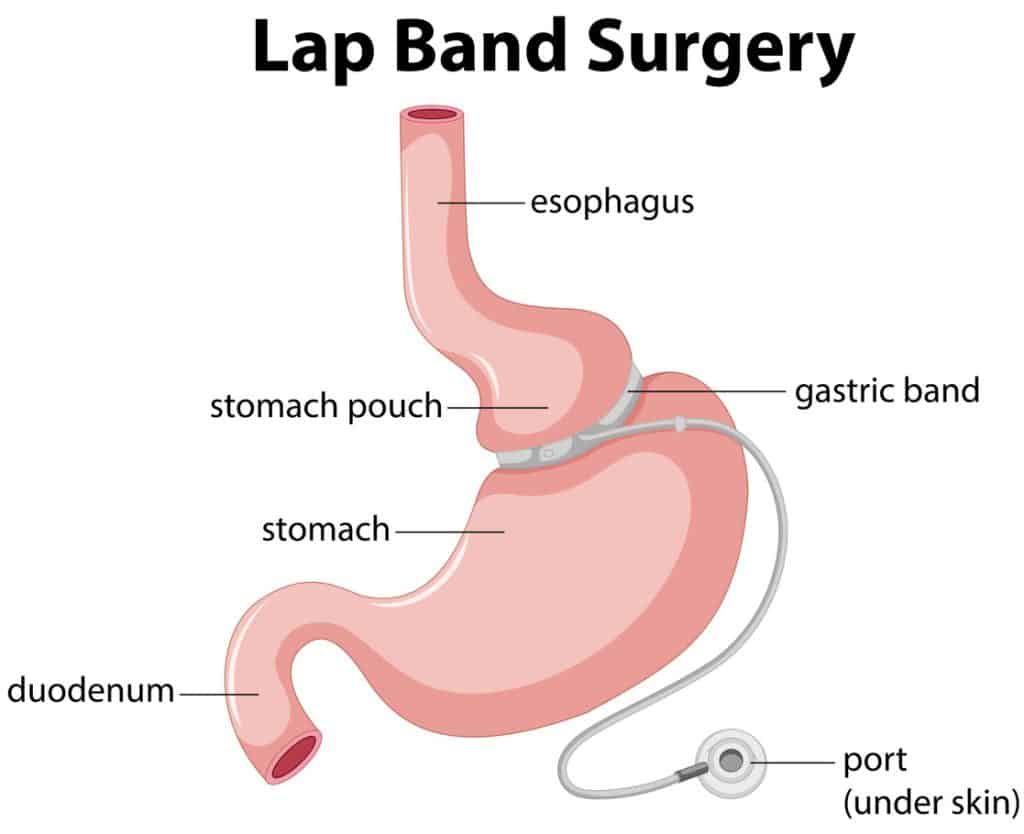Requirements For Gastric Sleeve Surgery
Gastric sleeve surgery (commonly referred to as sleeve gastrectomy) is one of the most successful weight loss surgeries for people suffering from severe obesity. The procedure reduces stomach size to help you absorb food less rapidly and feel full faster, providing effective weight loss results.
Before undergoing this operation, certain criteria must be fulfilled in terms of being physically and psychologically prepared to make necessary lifestyle changes after surgery.
Qualifications For A Gastric Sleeve
If you are overweight or obese, your doctor may suggest gastric sleeve surgery to help with weight loss by restricting how much food can be eaten at once. It can also assist those experiencing health issues related to obesity such as high blood pressure or heart disease.
Laparoscopic surgeries use small incisions for these procedures, using small cameras and long, narrow tools to access the stomach through small incisions and create a sleeve of abdominal skin.
Your doctor administers general anesthesia so you are completely asleep for the procedure. Following surgery, medical staff monitor your condition in a recovery room.
After having a sleeve gastrectomy, patients can expect to lose 50 to 90 pounds within 12 months by adhering to a strict diet that includes eliminating fatty foods, carbonated beverages, red meat and processed food from your diet as well as eating smaller portions and taking vitamins and supplements.
For gastric sleeve procedures to be effective, patients must be suffering from severe obesity (Class III). Your physician will consider your BMI and any medical conditions to decide if you qualify.
If your physician recommends gastric sleeve surgery, insurance can usually help cover its cost. Your provider may have eligibility criteria; so be sure to inquire.
To be eligible for a sleeve gastrectomy, your body mass index (BMI) must be 40 or higher or 35 kg/m2, plus at least one condition related to obesity such as type 2 diabetes or high cholesterol. Furthermore, you’ll have to commit to an intensive medically supervised weight loss program for at least 3-7 consecutive months before surgery can take place.
Requirements For A Gastric Bypass
Gastric bypass surgery is a surgical method designed to help individuals lose weight more effectively. This procedure is often utilized as a form of treatment for obese individuals who have failed to shed pounds through diet and exercise alone, or those suffering from chronic diseases like diabetes, high blood pressure or heart disease.
Your surgeon will create a small stomach pouch by either stapling part of your stomach together or vertical banding, to limit how much food can be eaten at one time.
Your surgeon will then reroute the remainder of your digestive system, so that fewer calories enter your system and contribute to weight loss and sustained weight management. This should help you shed extra pounds without returning again later.
Your surgeon will use staples to form a new stomach pouch in the upper portion of your stomach. Your small intestine will then be reconfigured so it connects with this new pouch.
Reduce how much food enters your body at once and feel full faster after each meal, and stop your stomach from producing excess acids and enzymes, which could otherwise cause nausea and even cause you to pass out.
Your doctor will also stitch the end of your intestine into the new stomach pouch so you can consume smaller portions at one time. They may prescribe a liquid diet initially before progressing to solid foods.
After your surgery, you should plan to spend at least a couple of days in hospital. A breathing tube should be in your trachea (windpipe), providing oxygen and anesthetic gas throughout your surgery. Once complete, you will be free to return home when ready.
Long Term Diet After Gastric Sleeve Surgery
Undergoing gastric sleeve surgery can be effective at helping you shed extra pounds, but requires making long-term changes to your diet. You must eat smaller meals throughout the day while adhering to an regimented plan designed to ensure you receive all of the essential vitamins and nutrients.
Your stomach has shrunk significantly – approximately the size of an egg – making it essential to take time and chew carefully while eating to facilitate easier digestion of food and reduce risk for pain and nausea.
Start by replenishing your body with clear fluids such as water, dilute squash, herbal and fruit tea (including fruit-flavored), and diluted juices containing electrolytes in order to stay hydrated and avoid dehydration.
Gradually add nutritious liquids such as skimmed milk, smooth soups, Marmite and Bovril drinks, fruit juices and meal replacement drink mixes into your diet. Beware of sugary beverages, carbonated drinks and high fat options like cheese and chocolate which could pose risks.
Once your stomach has adjusted to the new texture of liquids, you can gradually introduce solid foods with a pureed consistency. This phase typically lasts approximately two weeks and involves eating four to six small pureed meals each day.
At this stage, it is recommended to consume 2 to 2.5 liters of fluid each day in order to stay hydrated and avoid dehydration.
After surgery, it is wise to take lifelong multivitamin and mineral supplements; your surgeon should advise taking such products.
As part of your post-op diet, consider including foods like minced or wafer thin meats, fish, cauliflower cheese, cottage cheese, canned or soft fruit, cooked vegetables and rice or pasta in at least three well-balanced meals daily to maintain energy levels and nutritional intake. It’s essential that at least three well-balanced meals be taken every day for maximum energy intake and to prevent energy drain.

Complications With Gastric Bypass
Roux-en-Y gastric bypass surgery is a surgical process designed to alter how your stomach and small intestine absorb food, so that you consume fewer calories while feeling satisfied more quickly.
Diet and exercise alone have not helped you shed unwanted weight; surgery could also be required if there are serious health complications due to obesity.
Gastric bypass can come with complications that include infection, blood clots, breathing issues and leaks in your gastrointestinal system (intestines). Some complications are more serious than others.
Peritonitis is one of the most serious complications following gastric bypass surgery and should never be left untreated. This condition occurs when inflammation strikes your peritoneum (the smooth membrane that lines your abdominal cavity), leading to infection of its smooth membrane that lines your abdomen cavity.
“Dumping syndrome,” or food dumping, occurs when solid parts of food enter your small intestine instead of being digested and can be very uncomfortable – sometimes leading to discontinuing eating altogether or needing hospital care.
Dumping Syndrome symptoms typically include stomach pain, diarrhea and cramps that can usually be treated through diet changes or medication.
gastroesophageal reflux disease, commonly referred to as heartburn, is another side effect of gastric bypass surgery that often arises. There has been much discussion over whether this condition worsens after weight loss surgery but up to 47% of patients report experiencing heartburn after this weight reduction procedure.
Deep Vein Thrombosis and Pulmonary Embolus, two potentially life-threatening complications of bariatric surgery, occur in approximately 2% of patients but they are rarely fatal. Their risk increases in patients who are obese as well as have had prior venous thrombosis episodes.
Cons To Gastric Sleeve
Gastric sleeve surgery is one of the most successful and widely adopted bariatric surgeries available, helping thousands of people shed extra weight over the years. While safe and effective weight loss surgeries exist, such as gastric bypass and gastric sleeve procedures have some drawbacks that should be carefully considered before making your decision on whether this procedure is right for you or not.
Gastric sleeve surgery cannot be undone once completed; its effects cannot be reversed once cut and stapled into an anorexic tube shape known as a sleeve. Therefore, patients undergoing gastric sleeve should prepare to make significant lifestyle adjustments and follow all dietary recommendations for life after undergoing this type of surgery.
Another issue associated with gastric sleeve surgery is reflux (in which acid from the stomach moves upward into the esophagus), even after weight loss. Reflux can usually be treated using medication, however some sleeve patients may require bypass surgery to manage symptoms effectively.
Some patients can develop dumping syndrome, in which food passes too rapidly through the digestive tract and leads to diarrhea or vomiting. Although less common than many may fear, this condition usually resolves itself with medication or diet changes.
Sleeve operations should not be undertaken within 18 months after planning to become pregnant, due to obesity’s risk for uterine cancer and preeclampsia which put both mother and unborn baby at risk of complications during gestation.
A sleeve gastrectomy can assist in managing obesity-related lipid disorders, including high cholesterol, triglyceride levels and fatty liver disease. The procedure works by decreasing fats and lipids stored within your body – thus helping control these conditions.
Common Misconceptions about Requirements For Gastric Sleeve Surgery
- While gastric sleeve surgery is typically recommended for people with a BMI of 40 or higher (which is considered morbidly obese), it can also be an option for people with a BMI of 35 or higher who have weight-related health issues, such as diabetes or high blood pressure.
- While many people who have gastric sleeve surgery have struggled to lose weight through traditional methods, it’s not a requirement for the surgery. Some people may choose to have gastric sleeve surgery as a tool to help with their weight loss journey.
- Gastric sleeve surgery can be an effective tool for weight loss, it’s not a quick fix. Patients still need to make long-term lifestyle changes in order to maintain their weight loss and stay healthy. Additionally, gastric sleeve surgery comes with risks and potential complications, and it’s important for patients to fully understand these risks before deciding to undergo the surgery.
- Making healthy lifestyle changes can help maximize weight loss after gastric sleeve surgery, it’s not a requirement for the surgery. Ultimately, the decision to make lifestyle changes is up to the individual.
Questions From Our Patients
- What is the BMI requirement for gastric sleeve surgery?
The BMI requirement for gastric sleeve surgery is typically 40 or higher, but it can also be an option for people with a BMI of 35 or higher who have weight-related health issues. - Do you have to be unable to lose weight through diet and exercise to qualify for gastric sleeve surgery?
No, while many people who have gastric sleeve surgery have struggled to lose weight through traditional methods, it’s not a requirement for the surgery. - Do you have to make major lifestyle changes after gastric sleeve surgery?
While making healthy lifestyle changes can help maximize weight loss after gastric sleeve surgery, it’s not a requirement. Ultimately, the decision to make lifestyle changes is up to the individual. - Is gastric sleeve surgery a “quick fix” for weight loss?
No, gastric sleeve surgery is not a quick fix. Patients still need to make long-term lifestyle changes in order to maintain their weight loss and stay healthy. - What are the risks of gastric sleeve surgery?
Gastric sleeve surgery comes with risks and potential complications, including bleeding, infection, blood clots, and leakage from the staple line. - Can you regain weight after gastric sleeve surgery?
Yes, it is possible to regain weight after gastric sleeve surgery if you do not make long-term lifestyle changes. - Is gastric sleeve surgery covered by insurance?
Gastric sleeve surgery may be covered by insurance if certain criteria are met, such as having a high enough BMI and experiencing weight-related health issues. However, insurance coverage can vary depending on the individual policy.

